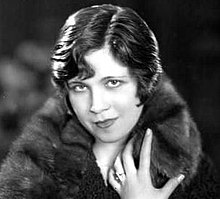Estelle Brody
| Estelle Brody | |
|---|---|

Promotional photograph
|
|
| Born |
15 August 1900 New York City, New York, U.S. |
| Died | 3 June 1995 (aged 94) Valletta, Malta |
| Occupation | Actress |
| Years active | 1926 – 1980 |
| Spouse(s) | Robert Fenn |
Estelle Brody (15 August 1900 – 3 June 1995) was an American actress who became one of the biggest female stars of British silent film in the latter half of the 1920s. Her career was then derailed by a series of ill-advised decisions and she disappeared from sight for many years before re-emerging between the late 1940s and the 1960s in smaller supporting film and television roles.
Brody was born in New York City, and began her career as a dancer in vaudeville. After working for some time as part of a touring troupe travelling round the U.S., she moved to England in the 1920s, finding work in West End theatres. Although Brody had no previous acting experience, her vivaciousness was spotted by film director Thomas Bentley, who offered her a supporting role in his 1926 film White Heat. She then immediately landed the lead role for Maurice Elvey in Mademoiselle from Armentieres, set in France during World War I. This turned out to be a huge popular success, running in British cinemas for several months and becoming reportedly the highest-grossing British-made film of 1926. To Brody's great surprise, she found herself acclaimed as a new star by the British media. At the time there was a general feeling, both from critics and audiences, of dissatisfaction with what was seen as excessive American influence on British film-making. To pre-empt this, publicity material falsely claimed Brody to be a Canadian citizen. This was accepted as fact, and the misapprehension would persist throughout her career.
Brody spent the remainder of the 1920s starring in a number of high-profile productions which earned her critical and popular acclaim as a natural in front of the camera. Reflecting on this period in later life, Brody commented: "Apparently my work went over well. Beyond my wildest dreams". Her most enduring performance is generally considered to be in 1927's Hindle Wakes, again for Elvey. This was the second silent version of the famous, and controversial in its time, stage play by Stanley Houghton, and received an appropriate budget for a prestige production. Extensive location filming took place in Manchester and Blackpool, giving the film a documentary realism feel very unusual in British silent cinema, which is now regarded as a valuable socio-historical portrait of 1920s Lancashire.
...
Wikipedia
